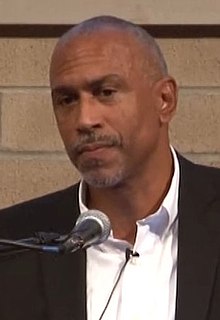A Quote by Raila Odinga
Since the Moi era, or 'error' as I call it, prime jobs have been stuffed with semi-literate Kalenjin herdsmen. I imagined that Mwai Kibaki would correct this but in fact he maintained many of them, and those he sent home were replaced by his kleptocratic tribesmen.
Related Quotes
The size of the U.S. middle class has been shrinking. Wages have been stagnant. We don't have those factory jobs that paid a living wage and enabled a family to have a home where the wife did not have to work. But we sent our factories abroad and there is no likelihood of getting them back. Equally worrisome is that some managerial jobs and professional jobs (such as lawyers) which support middle class life are threatened by automation.
We were great mates [with Rajiv Gandhi]: very, very, very close friends. In fact, on my visit to India as Prime Minister, we were going to his home for dinner. There were two aspects I remember: one is him saying how he had trouble with his security people, because they insisted he wears a vest. He said it was very uncomfortable and he often took it off, but of course, in the end, it wouldn't have mattered if he'd been wearing three vests - he would have been gone.
The lights were off so that his heads could avoid looking at each other because neither of them was currently a particular engaging sight, nor had they been since he had made the error of looking into his soul. It had indeed been an error. It had been late one night-- of course. It had been a difficult day-- of course. There had been soulful music playing on the ship's sound system-- of course. And he had, of course, been slightly drunk. In other words, all the usual conditions that bring on a bout of soul searching had applied, but it had, nevertheless, clearly been an error.
Were the judgments of mankind correct, custom would be regulated by the good. But it is often far otherwise in point of fact; for, whatever the many are seen to do, forthwith obtains the force of custom. But human affairs have scarcely ever been so happily constituted as that the better course pleased the greater number. Hence the private vices of the multitude have generally resulted in public error, or rather that common consent in vice which these worthy men would have to be law.
Not only had I not expected a random call from Joe Biden, but I could never have imagined he would make that call to ask me out. I've been asked if I was starstruck by the fact that a U.S. senator thought I was worth a call, but I honestly wasn't. I was flattered that someone I'd heard of was interested.
Musalia [Mudavadi] was created by [Daniel Toroitich arap] Moi and given his seat after his father's death since Musalia's was one of Moi's key men and a beneficiary of the grand corruption of the day. I am aware of this but I recognize that I cannot get perfect partners, and truly my friends; there is an election to be won.
The origins of these [schooling] federal policies were tied to President Johnson's war on poverty. Supplemental funds were sent to school districts serving poor children to compensate for issues related to poverty. Since the enactment of NCLB, the focus on mitigating poverty has been replaced by a focus on accountability as measured by test scores.
I asked myself if I would kill my parents to save his life, a question I had been posing since I was fifteen. The answer always used to be yes. But in time, all those boys had faded away, and my parents were still there. I was now less and less willing to kill them for anyone; in fact, I worried for their health. In this case, however, I had to say yes. Yes, I would.
We've learned that women can and should do 'men's jobs,' for instance, and we've won the principle (if not the fact) of getting equal pay. But we haven't yet established the principle (much less the fact) that men can and should do 'women's jobs': that homemaking and child-rearing are as much a man's responsibility, too, and that those jobs in which women are concentrated outside the home would probably be better paid if more men became secretaries, file clerks, and nurses, too.
Things have gotten openly more extreme in the last few years. I was lecturing in Hungary, whose prime minister, Victor Orban, is an example of this trend. All over Budapest, statues have been replaced, museum exhibits have been redone, to turn ethnic Hungarians, not Jews, into the prime victims of the Germans during World War II. Five years ago, who would have thought this possible?






























